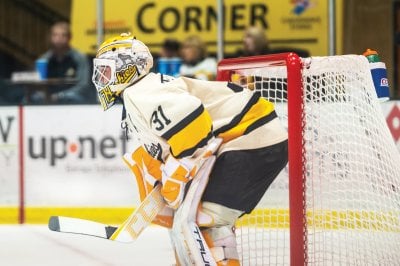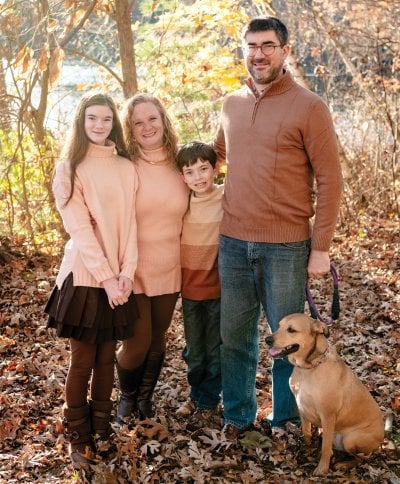Mechanical and Aerospace Engineering students and alumni are reaching for the stars! In the following stories, see how MAE students and alumni are using their skills in new business ventures, technology competitions, and much more!
ME Entrepreneurs Make Their Mark in the Great Outdoors
Mechanical engineering alumni Austin Gongos and Nathan Ackerman, who both earned their bachelor's degrees in 2018, are making headlines with their outdoor gear business, Chicken Tramper Ultralight Gear, based across the Keweenaw Waterway in Hancock. Gongos, at left in the photo of the two shown below, and Ackerman met as Phi Kappa Tau fraternity brothers. They'd always talked about starting a business. The company has grown to nine employees and has reached customers through the company's website and select retailers.
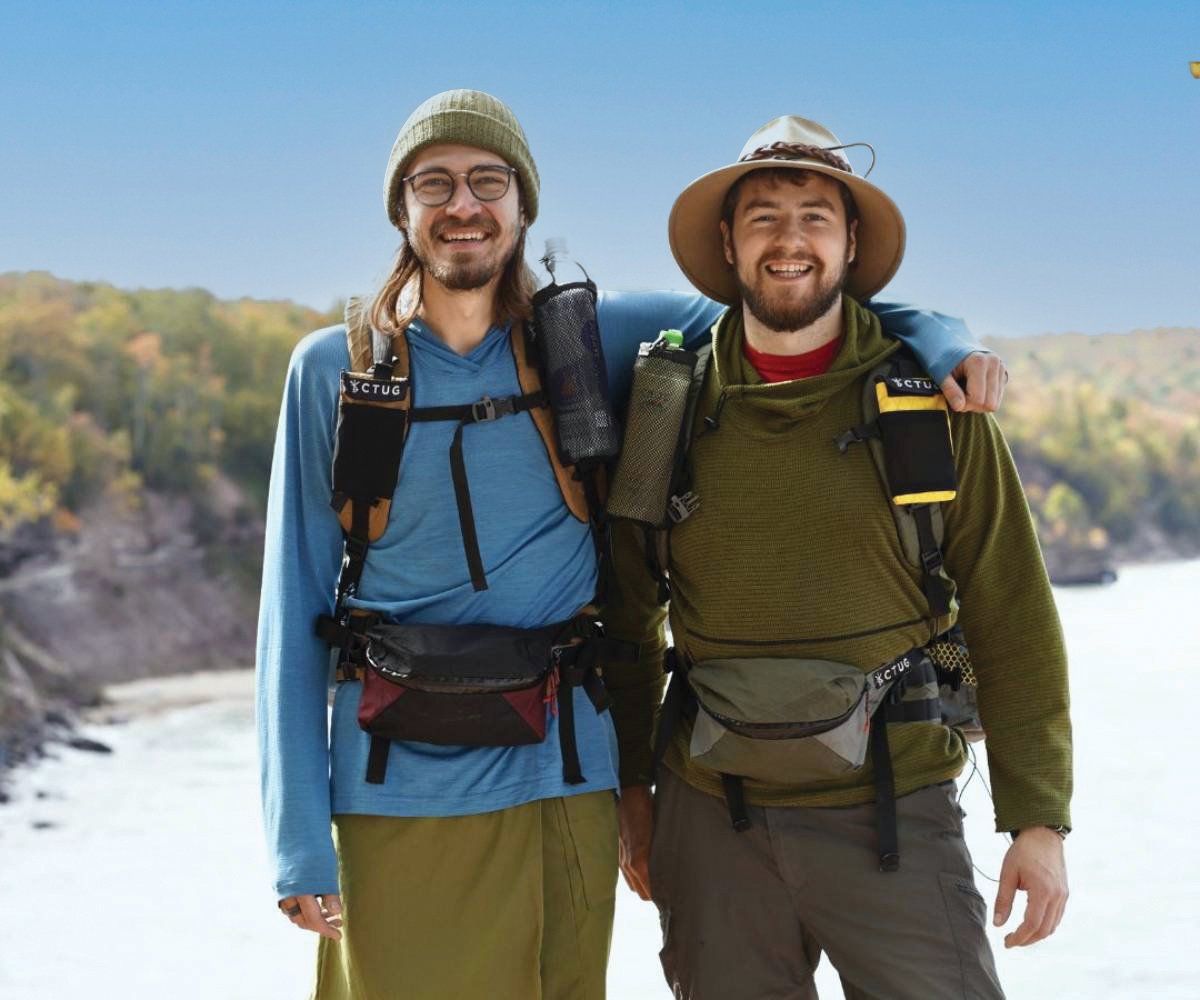
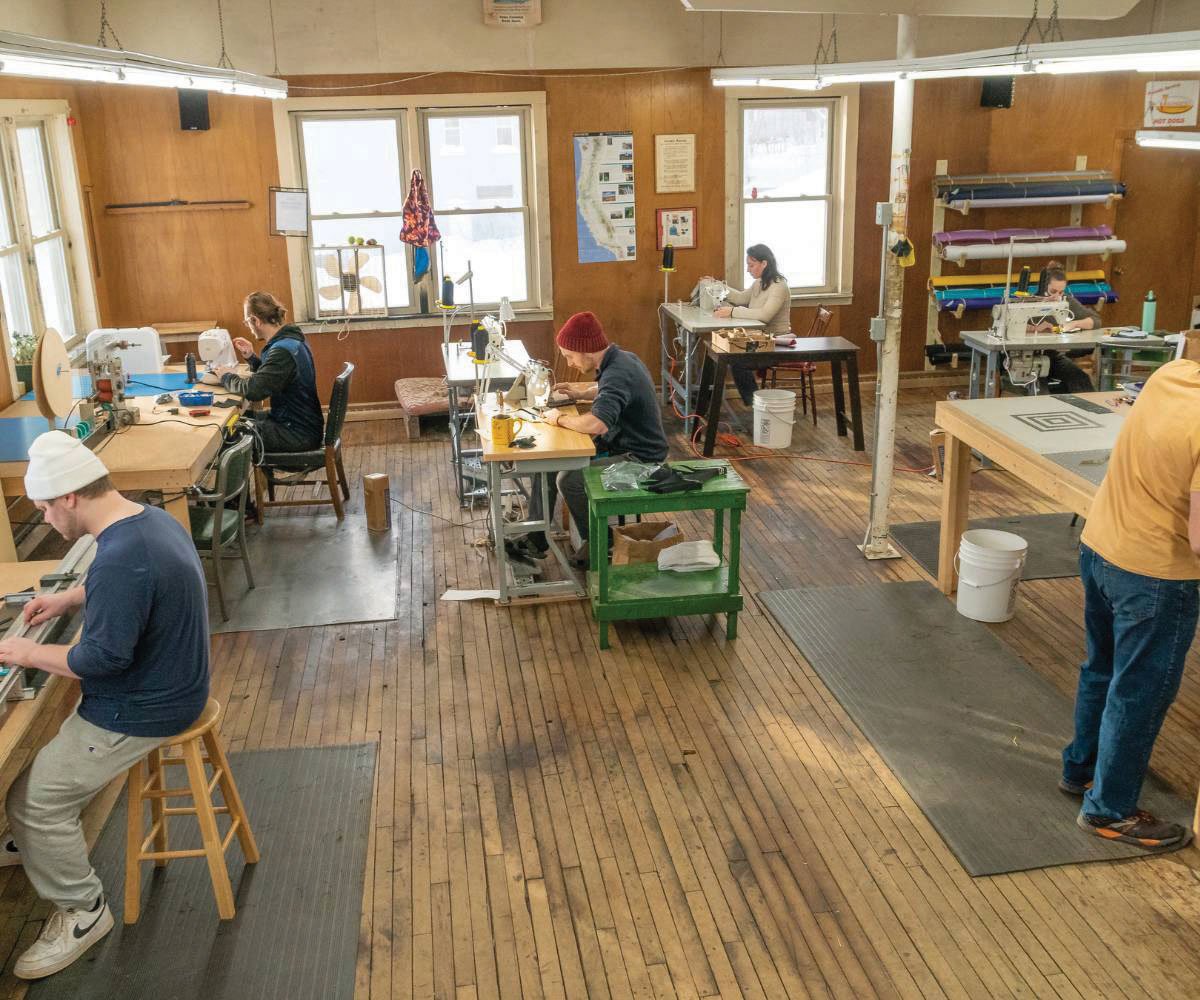
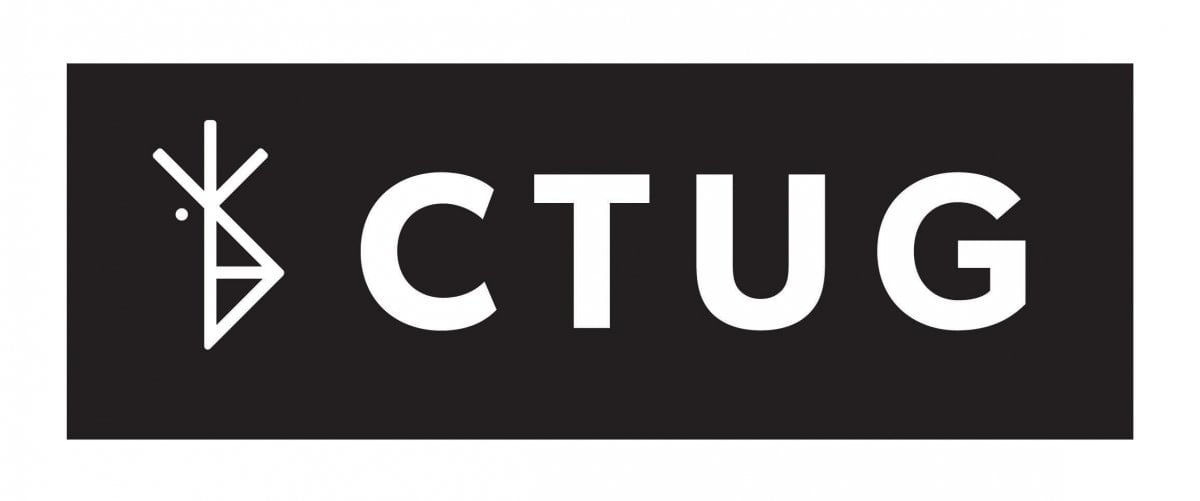
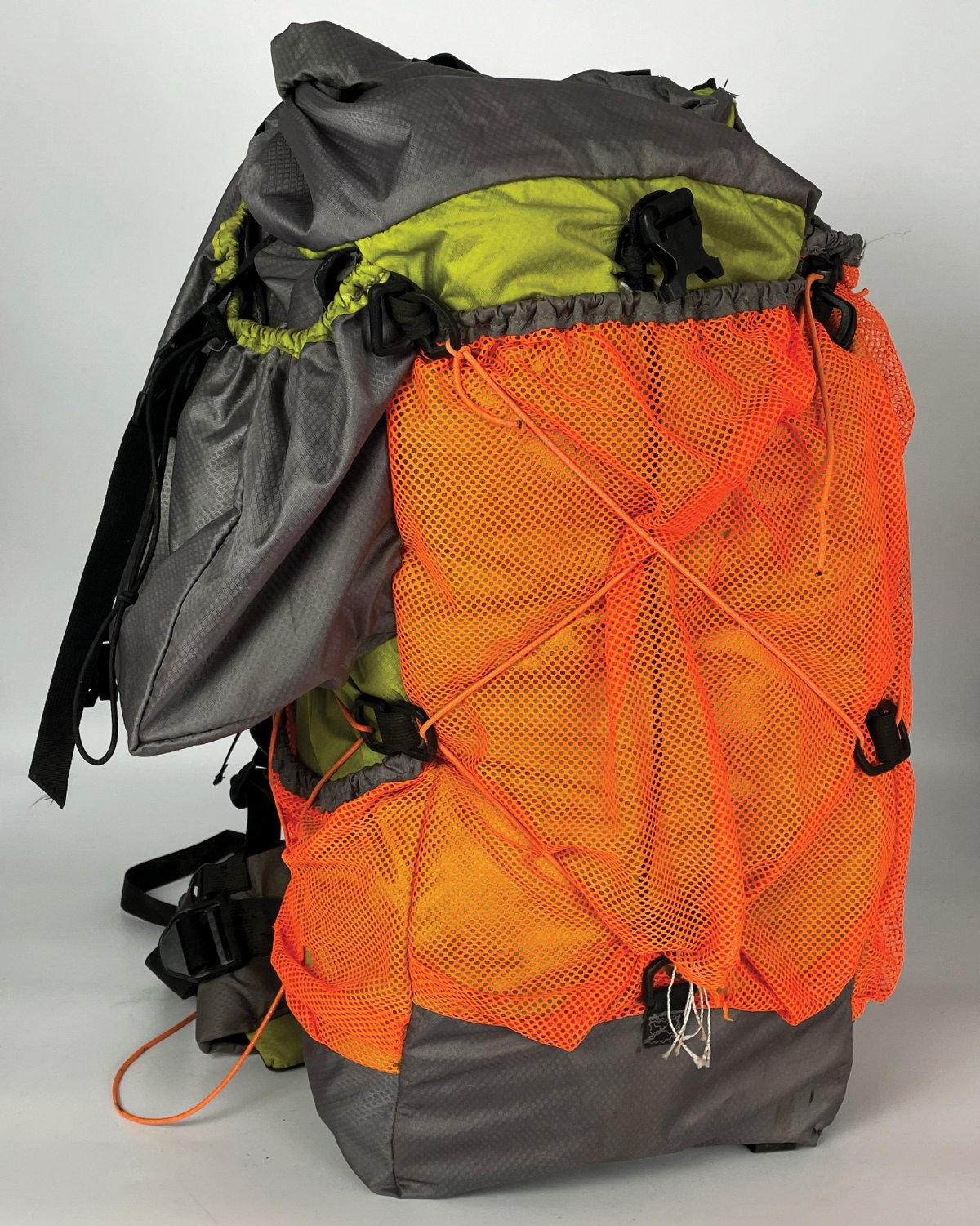
Read the full story in Michigan Tech Magazine.
ME Grad in Net Scores MBA Goal
In his storied five-year athletic career as goaltender for Michigan Tech's NCAA Division I men's ice hockey team, Blake Pietila racked up a list of honors and accomplishments. But he's no slouch when it comes to academic prowess. Pietila, who earned his bachelor's degree in mechanical engineering in 2023, set his sights on a master's in business administration at Tech in 2024.
Pietila was a contender for the Hobey Baker Award—an annual award given to the top NCAA men's ice hockey player—for four straight seasons, from 2021 to 2024, and was the Central Collegiate Hockey Association's 2023 Player of the Year. In 2024, the frequent game MVP and league player of the week celebrated another milestone: CCHA Student-Athlete of the Year.
"I wanted to pursue engineering because I was interested in design as well as analyzing and solving problems," said Pietila, who maintained a 3.62 cumulative GPA in 2024 and was named to the CCHA and Western Collegiate Hockey Association's All-Academic teams during his undergraduate engineering studies. "My decision to get an MBA was to help advance my career in engineering with the hopes of getting into management and being on the business side in engineering."
Pietila, who realized his childhood dream of playing hockey for Tech, said he knew that earning an engineering degree at Tech would be tough. "I was able to balance hockey and school well by using all the resources available to me at MTU," he said. "They worked with my difficult schedules over the years to help me succeed in the classroom. I was always at the library getting my schoolwork done—first priority—and I learned to work with other peers as I hope to do in my career someday."
Pietila was signed to an amateur tryout contract with the Cleveland Monsters in the American Hockey League in April after the end of his final season with the Huskies. He said he plans to take his hockey career as far as he can, knowing that his future holds additional options thanks to his Michigan Tech education.
No. 31
2022-23
2022-23
76
24
Enterprise Students Ride the Blue Wave in the 2025 Marine Energy Collegiate Competition
For the fourth year, Michigan Tech's SENSE (Strategic Experiences through Naval Systems Experiences) Enterprise has been selected to participate in the Marine Energy Collegiate Competition (MECC) sponsored by the US Department of Energy's Water Power Technologies Office.
MECC activities began in fall 2024, with 23 participating teams focusing on their challenges throughout the academic year. The competition concludes with in-person industry events in spring 2025. Students who engage in learning and solving challenges as part of the MECC have opportunities to discover careers based in water power.
During the course of the competition, Huskies will identify a promising market and design a device for the blue economy, which includes applications and solutions for marine energy technologies. The blue economy addresses a wide range of industry and societal needs, from providing power at sea to helping to create resilient coastal communities through meeting their energy needs.
SENSE members conduct prototype testing in MTU Wave—the wave tank lab, shown in the photo below, that's housed in the R. L. Smith Building. They're assisted by Tania Demonte Gonzalez, a recent PhD graduate and postdoctoral research associate with MAE. The team also receives ongoing technical support from the MTU Wave staff assisting with numerical modeling of the wave energy converter and the build and test phase of the competition.
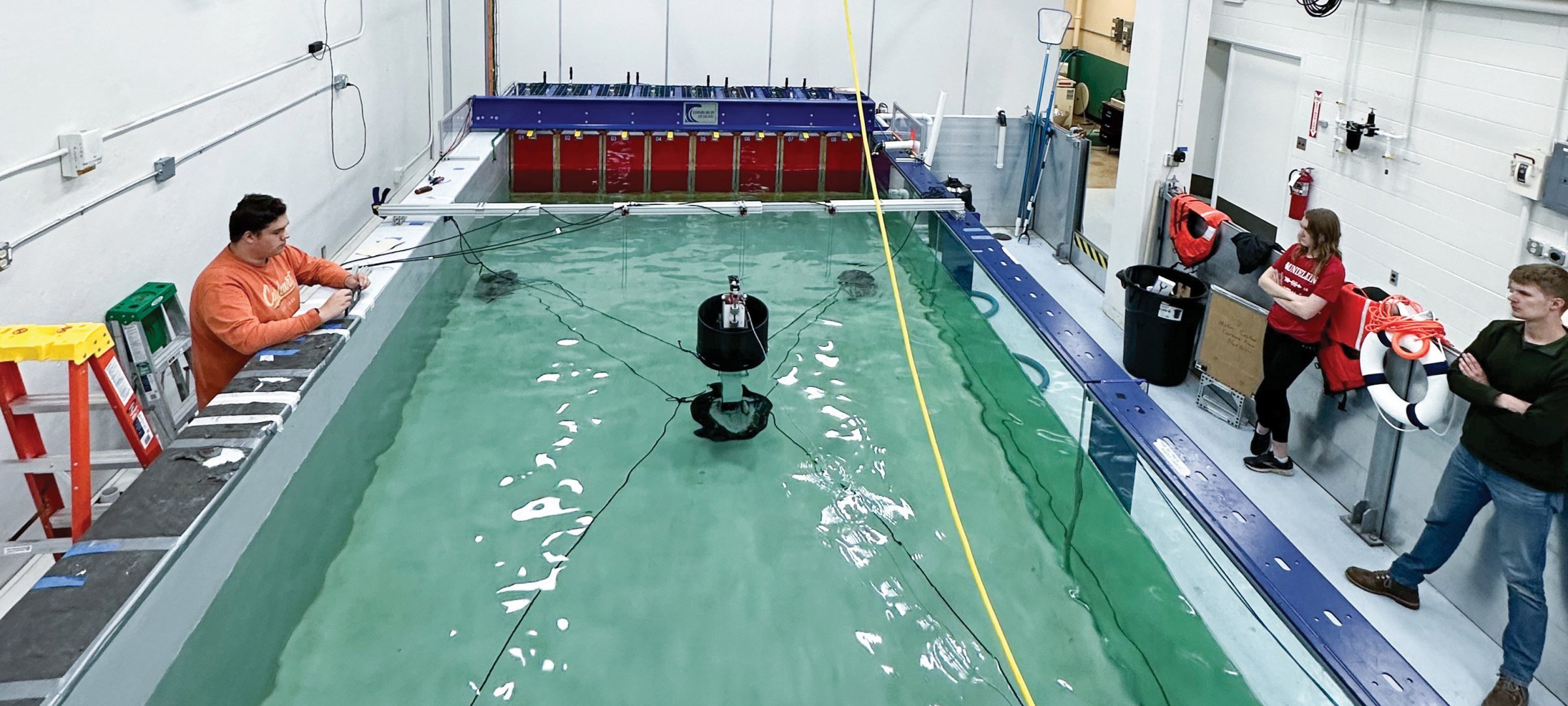
SENSE's team members include Emily Bauman, a mechanical engineering major who graduates in fall 2024. She's been a member for three years. "It has been a pleasure working with the MECC team, and each year I witness significant growth," she said. "I'm excited to see what our team will achieve this season!"
In last year's competition, the team built a prototype point absorber, a floating structure designed to charge autonomous underwater vehicles in the Great Lakes.
R.J. Slater, a senior mechanical engineering technology major pursuing minors in naval systems and technical theater, said the team will focus on optimizing the device in this year's competition, with the goal to deploy it in the future with the assistance of Michigan Tech's interdisciplinary Great Lakes Research Center (GLRC). The innovation will enhance lake mapping and improve transportation safety, according to Slater—a senior MECC competitor.
"It has been an incredible experience, offering the chance to collaborate with amazing people while developing green energy solutions using wave energy," he said, noting that wave energy is also called blue energy.
Another returning team member is senior mechatronics major Corbin Haischer, who will graduate in spring 2025 with minors in data acquisition and industrial controls. It will be his second year on the team and his first as project manager.
SENSE Enterprise advisor Tim Havens, director of the GLRC and Tech's Institute of Computing and Cybersystems, said being selected to compete in the MECC has been a valuable experience for team members. "Not only do the students get to build, test, and evaluate a real marine energy device, they also get the experience of learning how to evaluate a real-world market and engage with potential stakeholders."
Michigan Tech's Enterprise Program, offering real-world learning to student teams for 25 years, was launched through a collaborative effort led by the College of Engineering. Co-principal-investigators from across campus included Carl Anderson, mechanical engineering-engineering mechanics professor.
Feeding a Hunger for Lifelong Learning
Brandon Dilworth landed multiple internships and co-ops throughout his graduate and undergraduate studies. None of them were at MIT Lincoln Laboratory (MIT LL). But when he had the opportunity to apply there after earning his PhD in mechanical engineering at Tech in 2009, he jumped. He's been with the lab ever since—more than 15 years. And he's never stopped learning.
"Getting hired at MIT LL was my first job after graduating from Tech. What keeps me at the lab are the people, and the always evolving technologies that it develops for national security," Dilworth said. "There are so many different types of technologies to learn that it keeps the hunger for lifelong learning regularly nurtured."
Dilworth was initially involved in the lab's Lunar Laser Communication Demonstration, a project demonstrating how astronauts could communicate on the moon using lasers. His work has morphed in a variety of directions since.
"NASA and MIT LL have partnered on the development of laser communication systems for multiple decades. I have had the opportunity to offer influence in some of those steps, but it's an incredible team that has matured the technology," he said. "What you can find already in the public domain is a pretty accurate summary of the state-of-the-art with free-space optical communication systems. Bottom line, the missions can now have much higher data rates with communication systems that have much lower size, weight, and power (SWaP) as compared to their radio frequency (RF) counterparts."
Dilworth currently leads the Mechanical Engineering Group at MIT LL. "The group supports 100-plus prototyping programs a year, with optical communication systems being only one technology that the group helps to develop," he said, explaining that the lab's engineering division partners with all mission areas of the lab to develop technology prototypes that are key enablers for national security. "As the mechanical engineering group leader, I'm able to learn and offer insights into all of those technology spaces. It's a lot of fun to learn!"
Dilworth said he chose Tech for advanced studies after receiving his undergraduate degree at Kettering University because he knew what Tech offered would be crucial to his career.
"The work at MTU helped me learn more across multiple engineering disciplines," Dilworth said. "I went to Tech specifically to be a 'noise and vibration engineer'—more specifically, to study structural dynamics and acoustics."
"Part of that subdiscipline in ME is to learn data acquisition and signal processing, which are core to EE studies," he explained. "Being able to speak a similar language across multiple technical disciplines has been a key part of my successes at MIT LL."
Dilworth continued to pursue specialized studies as he launched his career. "The Program for Leadership Development (PLD) at Harvard Business School took my leadership skills to a new level," he said. "I had been assigned as a program lead before going through HBS PLD, and I had taken several short courses offered within MIT LL on leadership and program management, but PLD really just upped my skill level. I've become a more effective communicator, mentor, and technical leader.
"Many fundamentals of those skills I learned at Kettering and at MTU, but the HBS program really helped to sharpen the skill set."
Dilworth said he has a "bunch of really great memories" from his time at Tech but getting married to wife Emily at Houghton County Courthouse stands out. "My wife and I got married in the middle of my PhD program, which I usually say in jest that I don't recommend to anyone," said Dilworth. "We had so much support from the local community. While not a direct MTU memory, it's one that I will forever cherish. Especially now that my wife is no longer with us. She passed away after a short, but intense, battle with leukemia."
Among what Dilworth categorizes as "less personal and more technical memories" are the fieldwork opportunities at Tech. "Fieldwork really forces you to think through the engineering problem, prepare, bring spares of what you can, and execute under pressure of a timeline. A lot of learning happens in fieldwork," he said, noting that all of the projects he was involved in at Tech centered on collecting dynamic data for customers.
"Snowmobiles in northwest Minnesota during the first week of January—where it got as cold as minus 33 degrees Fahrenheit for outside testing!—excavator testing in a blizzard in Green Bay, Boston Whaler boat testing on the Portage, dynamics of a chip crushing machine at a paper mill in Iron Mountain, and days and days and days of testing snowmobiles at Keweenaw Research Center as part of my dissertation work—just to name a few! It was an awesome learning experience," he said.
His advice for current and future Huskies is to take advantage of those learning opportunities. "As a student, you're expected to make a mistake or two along the way, and that's not necessarily expected when you're working full-time," Dilworth said. "Learn as much as you can and gain as much experience as you can while you're still a student. Don't forget to have fun along the way! It's not all about the work—but put in the hard work, and you'll be rewarded."
Internships on Repeat: A Career Fest Success Story
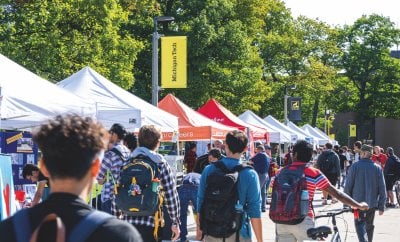
Sophie Bollin earned her bachelor's degree in mechanical engineering in spring 2024. Before returning to campus this fall to begin her master's studies, Bollin spent her summer at another familiar place: Caterpillar Inc., where she previously completed two internships focused in testing, validation, and design engineering in the company's paving products division. Bollin originally met Caterpillar recruiters at Michigan Tech's Career Fest, an informal on-campus event that takes place prior to fall Career Fair. She's also attended four Career Fairs.
"Design engineering was my main focus, which allowed me to work on a wide range of projects and designs, with wonderful mentors. I met so many fantastic people," said Bollin, who plans to stay in the heavy equipment or motorsports industries as a test engineer.
Learn more about Bollin's journey—and advice for first-year ME students—on the Mechanical and Aerospace Engineering News blog.
Living the Dream in Your Own Backyard
Sloane Zenner lives and works in Oshkosh, Wisconsin, pursuing a career as a mechanical engineer at Oshkosh Defense.
Zenner earned her bachelor's in mechanical engineering in 2021 and a master's in engineering management in 2023, both from Michigan Tech. She followed a path forged by her mom, Paula Feira Zenner '87 '93, who worked in industry after receiving her undergraduate engineering degree, later returning to the University to earn a master's degree in operations management.
"Sloane did one better than I did, though," said Paula. "She was able to accomplish her educational goals and be successful the entire time playing as a varsity basketball player at Tech! We are very proud of her."
Zenner's dad, Mark, is a '93 alumnus with degrees in civil engineering technology and business administration. The family, including older sister Blaire, resides the Houghton-Hancock area. Zenner said she feels lucky to have pursued and accomplished so many of her dreams right here in her hometown.
"I may be biased but the Keweenaw is a gorgeous place! I enjoy spending time outdoors," she said. "When I was given the opportunity to play basketball and get an engineering degree from MTU it was an easy choice. My family and friends are my biggest supporters, so it meant a lot that they were able to be present through the entirety of my sporting career."
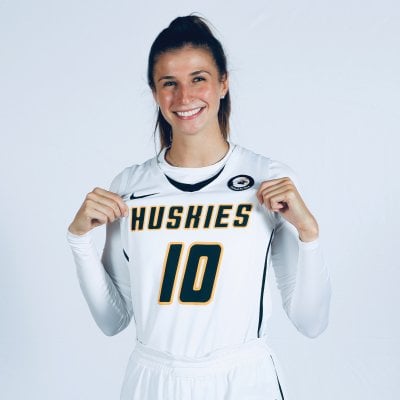
Zenner has always wanted to play for Tech. "Being given the opportunity to play for the team I watched and supported growing up was surreal. To know that I may be viewed as a role model to other local athletes, as I viewed past Husky players while a young kid, is a special opportunity," she said. "During my athletic career, I made endless memories with my teammates and coaches along the way. Several NCAA tournament appearances and winning the GLIAC Championship were a few of my most memorable highlights of my time on the team."
Zenner said she got experience equivalent to an internship without leaving Michigan Tech. "For two summers, I assisted Drs. Blough and DeClerk in the redesign of Mechanical Engineering Practice (MEP) IV. The team practiced on campus during the summer, so this allowed me the chance to complete an engineering design position while being able to stay in Houghton with the team."
Deciding on an engineering major wasn't difficult. "I knew that my skills in math and science would be a good starting point for a college degree, so I selected engineering—and it was a great choice," said Zenner. "My mother is also a Tech ME graduate, so I may have had a little bit of extra influence from that too!"
Zenner leveraged challenges to add an advanced degree to her education while extending her athletic career. "Because of COVID and injuries, I had extra years of eligibility," she said. "I had an interest that developed from my undergraduate minors in financial technology and manufacturing to pursue something in business. This master's is a complement to both—one-half engineering and one-half business management courses."
In addition to enjoying being relatively close to Houghton, Zenner is finding fulfillment in her role at Oshkosh Defense.
"It has been rewarding for me to take my formal engineering education and my ability to function successfully on a team and translate that to the workplace and be a part of the launch of the Next Generation Delivery Vehicle (NGDV) at Oshkosh Defense," said Zenner. "I had multiple opportunities presented to me as I was finishing up my degrees—Oshkosh Defense was a great position and would provide me the ability to use both my engineering and management skills within the first year."
Michigan Technological University is an R1 public research university founded in 1885 in Houghton, and is home to nearly 7,500 students from more than 60 countries around the world. Consistently ranked among the best universities in the country for return on investment, Michigan's flagship technological university offers more than 185 undergraduate and graduate degree programs in science and technology, engineering, computing, forestry, business, health professions, humanities, mathematics, social sciences, and the arts. The rural campus is situated just miles from Lake Superior in Michigan's Upper Peninsula, offering year-round opportunities for outdoor adventure.

